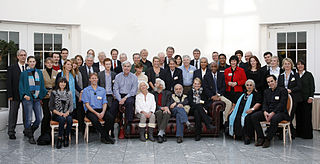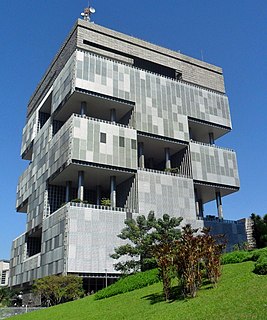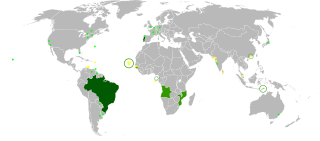Environmental protection is the practice of protecting the natural environment by individuals, organizations and governments. Its objectives are to conserve natural resources and the existing natural environment and, where possible, to repair damage and reverse trends.

Economic sanctions are commercial and financial penalties applied by one or more countries against a targeted self-governing state, group, or individual. Economic sanctions may include various forms of trade barriers, tariffs, and restrictions on financial transactions. An embargo is similar, but usually implies a more severe sanction. Economic sanctions generally aim to change the behavior of elites in the target country. However, the efficacy of sanctions is debatable and sanctions can have unintended consequences. Economic sanctions are not necessarily imposed because of economic circumstances—they may also be imposed for a variety of political, military, and social issues. Economic sanctions can be used for achieving domestic and international purposes.
Energy policy is the manner in which a given entity has decided to address issues of energy development including energy production, distribution and consumption. The attributes of energy policy may include legislation, international treaties, incentives to investment, guidelines for energy conservation, taxation and other public policy techniques. Energy is a core component of modern economies. A functioning economy requires not only labor and capital but also energy, for manufacturing processes, transportation, communication, agriculture, and more.

Science and technology in Brazil has entered the international arena in recent decades. The central agency for science and technology in Brazil is the Ministry of Science and Technology, which includes the CNPq and Finep. This ministry also has direct supervision over the National Institute for Space Research, the National Institute of Amazonian Research, and the National Institute of Technology (Brazil). The ministry is also responsible for the Secretariat for Computer and Automation Policy, which is the successor of the SEI. The Ministry of Science and Technology, which the Sarney government created in March 1985, was headed initially by a person associated with the nationalist ideologies of the past. Although the new minister was able to raise the budget for the science and technology sector, he remained isolated within the government and had no influence on policy making for the economy.

Fundação Nacional do Índio or FUNAI is a Brazilian governmental protection agency for Indian interests and their culture.

Environmental policy is the commitment of an organization or government to the laws, regulations, and other policy mechanisms concerning environmental issues. These issues generally include air and water pollution, waste management, ecosystem management, maintenance of biodiversity, the protection of natural resources, wildlife and endangered species. Concerning environmental policy, the importance of implementation of an eco-energy-oriented policy at a global level to address the issues of global warming and climate changes should be accentuated. Policies concerning energy or regulation of toxic substances including pesticides and many types of industrial waste are part of the topic of environmental policy. This policy can be deliberately taken to direct and oversee human activities and thereby prevent harmful effects on the biophysical environment and natural resources, as well as to make sure that changes in the environment do not have harmful effects on humans.
The National Security Council (NSC) is Israel's central body for coordination, integration, analysis and monitoring in the field of national security and is the staff forum on national security for the Israeli Prime Minister and Government. However, national security decisions typically made by national security councils in other countries are handled by the Security Cabinet. The Council draws its authority from the government and operates according to guidelines from the Prime Minister.

The World Future Council (WFC) is an independent body formally founded in Hamburg, Germany on 10 May 2007. "Formed to speak on behalf of policy solutions that serve the interests of future generations", it includes members active in governmental bodies, civil society, business, science and the arts. The WFC's primary focus has been climate security, promoting laws such as the renewable energy Feed-in tariff. The World Future Council has special consultative status with the Economic and Social Council.
Energy in France is the energy and electricity production, consumption and import in France.

Brazil is the 10th largest energy consumer in the world and the largest in South America. It is an important oil and gas producer in the region and the world's second largest ethanol fuel producer. The government agencies responsible for energy policy are the Ministry of Mines and Energy (MME), the National Council for Energy Policy (CNPE), the National Agency of Petroleum, Natural Gas and Biofuels (ANP) and the National Agency of Electricity (ANEEL). State-owned companies Petrobras and Eletrobrás are the major players in Brazil's energy sector, as well as Latin America's.

The American Wind Energy Association (AWEA) is a Washington, D.C.-based national trade association formed in 1974, representing wind power project developers, equipment suppliers, service providers, parts manufacturers, utilities, researchers, and others involved in the wind industry.
The Brazilian National Agency of Petroleum, Natural Gas and Biofuels is the federal government agency linked to the Ministry of Mines and Energy responsible for the regulation of the oil sector.

The environment of Brazil is characterized by high biodiversity with a population density that decreases away from the coast.
Environmental issues in Brazil include deforestation, illegal wildlife trade, illegal poaching, air, land degradation, and water pollution caused by mining activities, wetland degradation, and severe oil spills.
Water resources management is a key element of Brazil's strategy to promote sustainable growth and a more equitable and inclusive society. Brazil's achievements over the past 70 years have been closely linked to the development of hydraulic infrastructure for hydroelectric power generation and just recently to the development of irrigation infrastructure, especially in the Northeast region.
The electricity sector in Brazil is the largest in South America. Its currently installed capacity by the end of 2016 was 150,338 MW, a 9.500 MW increase on 2015. The installed capacity grew from 11,000 MW in 1970 with an average yearly growth of 5.8% per year. Brazil has the largest capacity for water storage in the world, being highly dependent on hydroelectricity generation capacity, which meets over 70% of its electricity demand. The national grid is composed 80% from renewable sources. This dependence on hydropower makes Brazil vulnerable to power supply shortages in drought years, as was demonstrated by the 2001-2002 energy crisis.
Even though progress has been made in conserving Brazil’s landscapes, the country still faces serious threats due to its historica land use. Amazonian forests substantially influence regional and global climates and deforesting this region is both a regional and global driver of climate change due to the high amounts of deforestation and habitat fragmentation that have occurred this region.

Same-sex immigration policy in Brazil or immigration equality is legal in Brazil since December 3, 2003, and the new text is of January 29, 2008. The Federal Police of Brazil, located in the Brazilian Airports, is the responsible by this initial procedure, that forwards the documents to the National Immigration Council of Brazil, located in Brasília, the federal capital. Which examines whether the union is true, such as opposite-sex couples.
Fundação Getúlio Vargas is a Brazilian higher education institution and think tank founded on December 20, 1944, with a mission "To stimulate Brazil’s socioeconomic development". Its initial objective was to prepare qualified people to work in public and private administration in Brazil.

The Igarapés do Juruena State Park is a state park in the state of Mato Grosso, Brazil.











